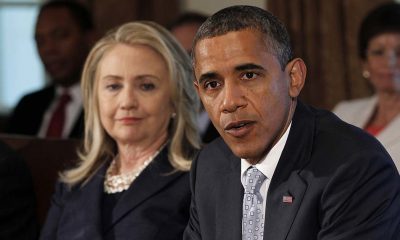World
Jindal, 24 other US governors say no to Syrian refugees

By Arun Kumar
Washington: After the Paris terrorist attacks, governors of at least 24 US states, all but one of them Republican, including Louisiana’s Indian-American governor Bobby Jindal, have announced they will not accept Syrian refugees.
The announcements came after authorities revealed that at least one of the suspects believed to be involved in the Paris attacks that left 129 dead and hundreds injured entered Europe among the current wave of Syrian refugees.
He had falsely identified himself as a Syrian named Ahmad al Muhammad and was allowed to enter Greece in early October.
Jindal, a long shot Republican presidential candidate, went a step further than other governors and issued an executive order Monday to prevent Syrian refugees from being resettled in Louisiana.
He cited a section of the Louisiana Constitution that says “during times of emergency … the governor has emergency powers to protect the citizens and property of the state of Louisiana,” according to Nola.com
Earlier in an open letter to President Barack Obama Saturday, Jindal said Washington needs “to investigate what happened in Europe before this problem comes to the United States,”
“It would be prudent to pause the process of refugees coming to the United States,” he said suggesting Obama hold off on taking in more refugees.
He also complained bitterly that the federal government had not informed his government about refugees being relocated to his state.
“It is irresponsible and severely disconcerting to place individuals, who may have ties to ISIS, in a state without the state’s knowledge or involvement,” Jindal said.
He demanded to know more about the people being placed in Louisiana to avoid a repeat of the Paris attacks and wanted to know whether screening would be intensified for refugees holding Syrian passports.
Jindal said that bringing Syrian refugees into the US without “proper prior screening and follow-up monitoring could result in a threat to the citizens and property of this state.”
States whose governors oppose Syrian refugees coming in include: Alabama, Arizona, Arkansas, Florida, Georgia, Idaho, Illinois, Indiana, Iowa, Kansas, Louisiana, Maine, Massachusetts, Michigan, Mississippi, Nebraska, New Hampshire, North Carolina, Ohio, Oklahoma, South Carolina, Tennessee, Texas and Wisconsin.
Only 1,500 Syrian refugees have been accepted into the US since 2011, but the Obama administration announced in September that 10,000 Syrians will be allowed entry next year.
Jindal is not the only Republican politician to criticise White House’s Syria policy in the wake of the Paris attacks.
Critics include Republican presidential candidates Marco Rubio, Ted Cruz and frontrunner Donald Trump, who has called accepting Syrian refugees “insane.”
“We all have heart and we all want people taken care of, but with the problems our country has, to take in 250,000, some of whom are going to have problems, big problems, is just insane. We have to be insane. Terrible,”
Donald Trump said at a rally in Beaumont, Texas. He did not explain how he got the 250,000 figure.
World
Lockdowns in China Force Urban Communities to Defy Censorship and Vent Frustration Online

Shanghai’s rich middle class is leading a wave of online dissent over the strict and prolonged lockdowns imposed in various parts of the country. Chinese internet censorship is struggling as patience is wearing thin in many urban centers, coming up with creative forms of online protests.
Social Media Posts Revealing Lockdown Tension in Shanghai
Drawn-out lockdowns are nothing new in China as authorities insist with the nation’s zero-Covid policy since the start of the pandemic. Currently over This time around, however, metropolitan areas like Shanghai are increasingly difficult to keep quiet, given that its more than 25 million residents have seen weeks of total isolation along with food shortages and many other service interruptions.
Dozens of towns and reportedly over 300 million Chinese citizens have been affected by lockdowns of different severity. As expected, urban netizens have been most outspoken over their difficulties by finding creative ways to get around state censorship and bans placed on topics, news comments and spontaneous campaigns.
Shanghai residents have been using mobile proxies and hijacking seemingly unrelated hashtags to talk about healthcare issues, delivery failures and the overall severity of their situation. The “positive energy” that the Chinese government wants to transmit during the recent prolonged series of lockdowns does not come naturally to those counting food supplies and online censors are working hard to filter words, trending topics and undesired social media sharing.
WeChat groups and message threads are under constant monitoring. Posts questioning the zero-Covid approach have been quickly deleted, including by leading Chinese health experts like Dr. Zhong Nanshan. Video footage is soon censored and protests and investigations are quickly made to disappear.
Where this has not worked, officials have exposed banners with warnings and outright threats like “watch your own mouth or face punishment”, while drones have been patrolling the city skies. Yet, if anything, this has led to further tensions and unspoken confrontation with Shanghai’s educated and affluent middle class.
Creative Online Solutions Harnessing Civic Energy
Announcements by Chinese social media that they would be publishing the IP addresses of users who “spread rumors” have not helped either. Tech industry research has shown that much of Asia’s tech-savvy population has a habit of using mobile proxies and other privacy tools, quickly finding workarounds to browse the internet freely and talk to the world about the hottest topics.
The sheer volume of forbidden posts is already a challenge for the very censorship system, experts explain. Unable to track all trending hashtags, state workers overlook topics that speak about the US, Ukraine or other popular news. Linking human rights elsewhere to their situation, Chinese online dissidents establish their informal channels and “hijack” the conversation to share personal or publicly relevant information about the Covid suppression in their town.
Sarcastic and satirical posts still dominate. Others hope to evade the censors by replacing words from famous poems or the national anthem. One thing is certain – social media, when harnessed with the right creativity, has proven its ability to mount pressure on the government in even some of the most strictly controlled tech environments like China.























